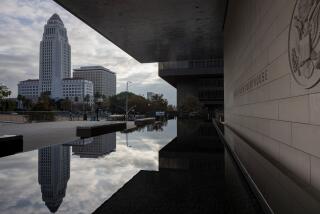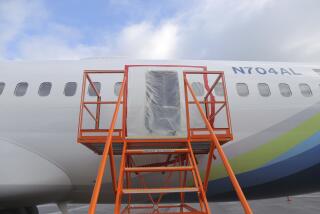Panel to Scrutinize Purchase of Parts for C-5B Cargo Jet
- Share via
An Air Force analyst reported last year that she had found a number of “horror stories” at Lockheed when she looked into an unusual $68.6-million program to buy spare parts for the sole purpose of fixing C-5B cargo jets if they should crash.
A congressional hearing today will look into whether the concept of Air Force purchase of the so-called crash damage kits was justified and why so many of the parts were priced so high. One Air Force review found that 39% of a sample of the parts failed an “intrinsic value test.”
“I am concerned about our culpability and possible ramifications if this buy ever becomes public,” Air Force cost/price analyst Capt. Kathy L. Johnson wrote in a report dated June 8, 1988.
Air Force officials in the Pentagon and Lockheed officials denied Tuesday that the program was unjustified or that the parts were overpriced. Indeed, they said, such crash damage kits have been purchased for other aircraft and have proved helpful in keeping the planes operating.
The House Energy and Commerce Committee’s subcommittee on oversight and investigations hearing will take testimony today from Assistant Air Force Secretary Daniel Rak and Maj. Gen. Richard D. Smith. The subcommittee is chaired by Rep. John D. Dingell (D-Mich.).
The Air Force first looked into buying the crash damage kits in 1983, following two accidents that damaged C-5s. In late 1986 and early 1987, the Air Logistics Command, which procures spare parts for various flying units in the Air Force, issued two orders to Lockheed for 65 crash damage kits.
The orders were unpriced but carried a combined “not-to-exceed” price of $68.6 million. Each kit consisted of about 6,500 items, including structural parts, washers, fasteners and shims.
But starting in mid-1988, the Air Force began to review the program amid growing concern that the program was a potential embarrassment.
Johnson, the Air Force analyst, wrote in a report in June, 1988, that the prices seemed “fair and reasonable” under a technical Air Force pricing system but that she considered them to be “in most cases exorbitant.”
According to her report, a pin was priced at $30.99, a pulley at $891.77 and a splice plate at $1,591.37.
The next month, the Air Force comptroller, Lt. Gen. Claudius E. Watts, advocated a stop-work order on the kits, pending a review.
“Progress payments cannot be properly administered, since neither the government nor the contractor knows precisely what is being procured and it is impossible to evaluate the contractor’s physical progress,” Watts wrote in a memo last July to Asst. Secretary of the Air Force John J. Welch.
Still later, other Air Force officials were concerned about a public relations battle with Dingell. Eric Thorson, acting assistant secretary of the Air Force, cited figures provided by the Air Force Systems Command indicating that 39% of the items reviewed in the Lockheed program “failed the intrinsic value test,” indicating that they were overpriced.
‘No Justification’
“If that model holds up, approximately 6,000 parts will be potential toilet pans for Mr. Dingell to hold up in a hearing,” Thorson wrote in a memo to Rak last year. The reference was to Lockheed-produced aircraft toilet pans, costing $640 each, that were widely criticized as overpriced.
Peter Stockton, a staff member of the oversight and investigations subcommittee, said, “There is no justification whatsoever. There is a C-5 at Travis Air Force Base right now with a 40-foot-hole in its top that the Air Force can’t afford to fix, because it is wasting its money on crash damage kits.”
An Air Force spokesman said Johnson’s report was being taken “out of context” and was intended to prevent potential abuses that the subcommittee is now alleging actually occurred.
Meanwhile, the Air Force Office of Special Investigations earlier this month began an investigation of the colonel who was in charge of buying the spare parts. He was identified by the subcommittee staff as retired Col. Anthony F. DiFerdinando.
DiFerdinando applied for a job at Lockheed when he was involved in the spare parts program, according to a General Accounting Office report to be released today. The colonel eventually accepted a job at Lockheed.
Lockheed spokesman Richard Martin said the company obeyed all federal regulations when it hired DiFerdinando and assigned him to work that is not related to his former government responsibilities.
The GAO investigation found that DiFerdinando had gone to Lockheed in June, 1986, to review Lockheed’s work on the kits about two weeks after submitting an employment application to the firm.
Although the GAO said it did not find any evidence that DiFerdinando’s actions in the C-5B crash kit program were influenced by his potential Lockheed employment, it said he did not comply with reporting requirements and had failed to disqualify himself from the program as required after making his employment application.
More to Read
Inside the business of entertainment
The Wide Shot brings you news, analysis and insights on everything from streaming wars to production — and what it all means for the future.
You may occasionally receive promotional content from the Los Angeles Times.











